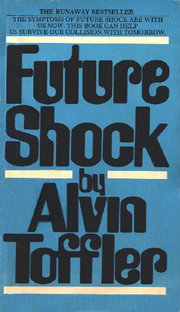"Futuroshk" Alvin Toffler
 At the end of June in Los Angeles , the philosopher and futurologist Alvin Toffler died in his home. The scientist has lived a long and fruitful life, incidentally refuting the stereotype of philosophers that is common in society, as about some refined personalities, slightly “not of this world”, constantly immersed in hard reflections. Far from academic gloss, Toffler, along with his wife, with whom he lived all his life, was fond of left-wing ideas and even worked as a welder and fitter at Cleveland's steel mills. Later, taking up journalism, he collaborated with many publications, including the well-known Playboy magazine, in which in 1964 he appeared in an interview with the famous Russian writer Vladimir Nabokov.
At the end of June in Los Angeles , the philosopher and futurologist Alvin Toffler died in his home. The scientist has lived a long and fruitful life, incidentally refuting the stereotype of philosophers that is common in society, as about some refined personalities, slightly “not of this world”, constantly immersed in hard reflections. Far from academic gloss, Toffler, along with his wife, with whom he lived all his life, was fond of left-wing ideas and even worked as a welder and fitter at Cleveland's steel mills. Later, taking up journalism, he collaborated with many publications, including the well-known Playboy magazine, in which in 1964 he appeared in an interview with the famous Russian writer Vladimir Nabokov.To some extent, the energetic image of Toffler can be compared with other famous scientists who lived at about the same time. For example, the famous planetologist Carl Sagan looked like a Hollywood star and gave an interview to Playboy, creating an image of an impressive man, boldly looking to the future and far from stereotypes. Around this very time, the future Nobel Prize-winning physicist Richard Feynman did not shy away from the nightlife in Las Vegas, played the Bongo drums in Cuba, and at the time was entertained by cracking safes in jest and argument. Toffler, of course, did not have an equally impressive reputation as Feynman, but he was far from the image of a gloomy philosopher. Maybe this is exactly what helped him to make very bold assumptions about the future of industrial and post-industrial society.

Alvin toffler
')
Toffler published his book, Futuroshok, in 1970. By this time, he already had a reputation as a respectable scientist - collaborated with such large companies as IBM and AT & T, who resorted to his services in researching the high-tech market. Toffler wrote an analytical report for IBM, devoted to the forecast of the introduction of computers in all spheres of human society. The level of competence of the scientist in the topic, which, it would seem, should be very far from the humanitarian mentality, can be estimated from a small excerpt from his book Metamorphoses of Power:
Read the quote
Since IBM still occupies a leading place, its operating systems retain users and restrain competitors, the London organization X / Open ("Open Systems") was formed to produce a standard for operating systems of minicomputers, equipment configurations (workstation) and personal computers (PC) - those are the areas in which IBM is most vulnerable. Networks created by companies such as American AT & T, DEC (Digital Equipment Corporation) and German Siemens (Siemens) now include Japanese Fujitsu networks (Fujitsu) - they all need a new standard that will be more “open” , which is a barrier to non-IBM hardware.
...
Even before the slowdown completely weakened her, IBM faced off against another adversary — she opposed the Bell company (Ma Bell), namely AT & T. Back in the 60s, AT & T software developed on the basis of the Unix operating system for its own purposes. She had such characteristics that allowed the system to universalize for some manufacturers of small computers. Without entering the computer business, AT & T gave them the opportunity to use Unix. Those, in turn, produced their own various versions of Unix systems for different customers. Unix became increasingly popular, and after the organization of Sun Microsystems, Inc. (a company that produces equipment of various configurations; was founded in 1982) its machines are increasingly seizing the market for this equipment
What is the 1960s of the last century, preceding the release of "Futuroshka"? This is not only the flight of Gagarin, The Beatles and the sexual revolution, but all the “charms” of the Cold War, along with the arms race and such tense events as the Caribbean crisis. In 1968, the Club of Rome was formed - a public organization that aims to unite intellectuals of the whole world to solve global problems of humanity, such as the exhaustion of the planet’s resources. The report of the Club of Rome is well known under the name Growth Limits, which asserts that mankind is light-minded about mining and that, after a fairly observable historical period of time (50-100 years), the planet’s population will inevitably encounter their extreme shortage.
According to the proposed development models, in the absence of qualitative changes, the beginning of the 21st century will be marked by a sharp decline in average per capita industrial production, and then the population of the planet. As we already know, this did not happen: oil production is constantly increasing , the population of the planet and global GDP are constantly growing . At the same time, humanity can boast not only smartphones and the Internet, but also the fact that there is a spacecraft near every planet of the solar system.
The fate of the report “The Limits to Growth” was surprisingly connected with another apocalyptic scenario. In 1971 in Venice at a conference organized by the Club of Rome, was attended by Soviet academician Nikita Nikolaevich Moiseev, who held the post of deputy director of the Computing Center of the Academy of Sciences. Moiseev reacted positively to the ideas of the report and in his speech spoke about his own project of a computer model predicting the development in time of a complex planetary organism - “atmosphere-ocean-biota”. Later, the theoretical and practical developments of Moiseev, including real programming, became the basis of the model known as the “nuclear winter”. According to it, in the case of nuclear explosions over the territories of cities and large-scale fires, a large number of soot will rise into the atmosphere, due to which sunlight will not reach the surface of the planet, which will lead to a significant decrease in air temperature.

Vladimir Alexandrov
Incidentally, a truly real dramatic episode is associated with the “nuclear winter”, which can easily serve as a scenario with a tense thriller. One of the students of Nikita Moiseev, who directly headed the laboratory for studying the dynamics of the ocean-atmosphere system and actually developed the concept of nuclear winter, disappeared without a trace on April 1, 1985, while at a conference in Madrid. And the word "without a trace" must be understood literally - there was no hype in the press, and all appeals of the USSR Ministry of Foreign Affairs to Spain with the requirements to explain the incident ended in vain. To this day, there are only various conspiracy theories about the fate of Aleksandrov, which are hardly worthy of a serious relationship to them.
How does a person feel in the cycle of events and problems of the modern metropolis? 90% of scientists who have ever lived on planet Earth, live in our era. If before the year 1500, 1,000 books were published per year, now there are 1,000 books published per day. Half of all the energy produced by mankind, has been spent in the last 100 years. Biologist Julian Huxley said that "... the rate of human evolution during the written history is at least 100,000 times faster than the rate of evolution before man appeared." There is a lot of everything, everything happens very quickly and there are a lot more questions than answers. Moreover, the situation is truly unique in that “there was no such thing before” (if one does not take into account the theory of a cyclically pulsating Universe). Toffler himself gives the following characteristic: “They [ changes - ed. ] also produce eccentric people: children who are no longer like children when they are twelve; adults who are fifty like twelve children. There are rich people playing poor, programmers lounging on LSD. There are anarchists, under the dirty cheap shirts of which ardent conformists are hiding, and conformists with tightly buttoned collars, who in their souls are ardent anarchists. ”

Photo - Flickr
It is this, hardly describable feeling, that Alvin Toffler called "futhorock" or "shock of the future." Despite the term implying the existence of a problem, the author did not give recipes to remedy the situation, because this would clearly go against the trends of the time. On the contrary, he predicted changes in which he would have to adapt. Toffler talked about cloning, cyborgization, "telecommunications around the world" (in other words, the Internet), genetic manipulation. He also mentioned social changes, such as homosexual and polygamous families. He described many subcultures of the future and said that one of the most popular will be conservatism, which rejects the too wild dynamics of life. It is curious that Toffler does not raise the question of what “norm” is and what, in fact, is considered defective - futuroshk himself or attempts to leave him, limiting himself. A person will have a choice of what to do.
In any case, acquaintance with the book "Futurok" will not pass unnoticed. On the one hand, because it is written in an easy language, far from the meme "philosophical treatise." On the other hand, the book deals with things that are very familiar to every thing — for example, computer technology or one’s own mental health. And finally, you can carefully assume that this will be a kind of manifesto of the future, with which each of us will have to face. Maybe right tomorrow.
Source: https://habr.com/ru/post/396177/
All Articles